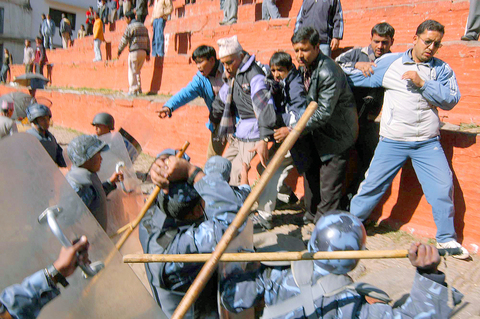Police kept tight security in place in Nepal's capital yesterday, as political parties vowed more protests against King Gyanendra's rule despite hundreds of arrests in recent days.
An alliance of seven parties has called for a nationwide strike on Thursday.
On Saturday police arrested more than 230 people after anti-royal demonstrators in Kathmandu clashed with officers who used tear gas and carried firearms in place of their usual bamboo batons.

PHOTO: AP
"Most of the people detained during Saturday's clashes were released late on Saturday night, and 61 remained in custody," said a police officer on condition of anonymity.
Around 150 political and human rights activists who were rounded up on Thursday and Friday remained in detention, the police officer added.
Opposition politicians vowed to keep up the protest program, calling a nationwide general strike for Thursday and planning district-level protests in an attempt to disrupt planned municipal elections.
"The people's movement has come to a new height and will not come to an end unless full democracy is restored," Shobhakar Parajuli, secretary of the Nepali Congress Party, said.
Another opposition leader condemned the government's use of force.
"The effects of the protests are getting very strong because the government is indulging in unnecessary actions by using excessive force," said K.P. Oli, a senior leader of the Nepal Communist Party (United Marxist Leninist).
"The government is suppressing people and we don't have any alternative but to continue protests," said Oli, who is under house arrest.
The parties have called for a boycott of local elections planned for Feb. 8 by Gyanendra, who is under increased international pressure to restore democracy after he sacked the elected government almost a year ago.
On Saturday groups of stone-throwing protesters clashed with police in running battles around Kathmandu's main square after a larger pro-democracy rally was banned.
Police arrested 236 people, an officer said later. Journalists and other eyewitnesses reported that some 300 demonstrators were rounded up and bundled into police vans.
Meanwhile, Maoist rebels and government forces clashed overnight in a village in southern Nepal, killing 14 militants and six security forces, the royal army said yesterday.
The gunbattle began on Saturday night after the insurgents attacked a security patrol in Phapar Badi village, 160km south of Kathmandu, an official at the Royal Nepalese Army headquarters said.

PRECARIOUS RELATIONS: Commentators in Saudi Arabia accuse the UAE of growing too bold, backing forces at odds with Saudi interests in various conflicts A Saudi Arabian media campaign targeting the United Arab Emirates (UAE) has deepened the Gulf’s worst row in years, stoking fears of a damaging fall-out in the financial heart of the Middle East. Fiery accusations of rights abuses and betrayal have circulated for weeks in state-run and social media after a brief conflict in Yemen, where Saudi airstrikes quelled an offensive by UAE-backed separatists. The United Arab Emirates is “investing in chaos and supporting secessionists” from Libya to Yemen and the Horn of Africa, Saudi Arabia’s al-Ekhbariya TV charged in a report this week. Such invective has been unheard of

US President Donald Trump on Saturday warned Canada that if it concludes a trade deal with China, he would impose a 100 percent tariff on all goods coming over the border. Relations between the US and its northern neighbor have been rocky since Trump returned to the White House a year ago, with spats over trade and Canadian Prime Minister Mark Carney decrying a “rupture” in the US-led global order. During a visit to Beijing earlier this month, Carney hailed a “new strategic partnership” with China that resulted in a “preliminary, but landmark trade agreement” to reduce tariffs — but

Chinese President Xi Jinping’s (習近平) purge of his most senior general is driven by his effort to both secure “total control” of his military and root out corruption, US Ambassador to China David Perdue said told Bloomberg Television yesterday. The probe into Zhang Youxia (張又俠), Xi’s second-in-command, announced over the weekend, is a “major development,” Perdue said, citing the family connections the vice chair of China’s apex military commission has with Xi. Chinese authorities said Zhang was being investigated for suspected serious discipline and law violations, without disclosing further details. “I take him at his word that there’s a corruption effort under

China executed 11 people linked to Myanmar criminal gangs, including “key members” of telecom scam operations, state media reported yesterday, as Beijing toughens its response to the sprawling, transnational industry. Fraud compounds where scammers lure Internet users into fake romantic relationships and cryptocurrency investments have flourished across Southeast Asia, including in Myanmar. Initially largely targeting Chinese speakers, the criminal groups behind the compounds have expanded operations into multiple languages to steal from victims around the world. Those conducting the scams are sometimes willing con artists, and other times trafficked foreign nationals forced to work. In the past few years, Beijing has stepped up cooperation